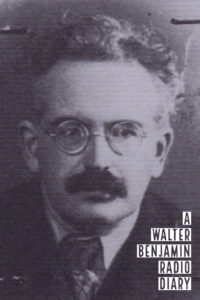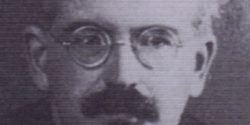This is the last entry of my diary of thoughts on Walter Benjamin’s radio talks. The anthology of his programs, from which I have been quoting for some time, concludes with an unpublished essay titled “Reflections on Radio.”
 “Every child recognizes that it is in the interest of radio to bring anyone before the microphone at any opportunity,” Benjamin wrote in 1930 or 1931, “making the public witness to interviews and conversations in which anyone might have a say.”
“Every child recognizes that it is in the interest of radio to bring anyone before the microphone at any opportunity,” Benjamin wrote in 1930 or 1931, “making the public witness to interviews and conversations in which anyone might have a say.”
“While people in Russia” were capitalizing on this recognition, he continued, “here [Germany] the dull term ‘presentation’ rules, under whose auspices the practitioner confronts the audience almost unchallenged.” In response, audiences resort to “sabotage” in their reactions, he observed, mostly switching off the radio at particularly intolerable moments.
“It is not the remoteness of the subject matter,” Benjamin warned;
“this would often be a reason to listen for a while, uncommitted. It is the voice, the diction, the language—in short, too frequently the technological and formal aspect makes the most interesting shows unbearable, just as in a few cases it can captivate the listener with the most remote material. (There are speakers one listens to even for the weather report).”
All this reminds me of the contemporaneous comments of Bertolt Brecht, who in 1932 famously (at least in media studies circles) critiqued radio as “one-sided when it should be two- . . . “
“It is purely an apparatus for distribution, for mere sharing out. So here is a positive suggestion: change this apparatus over from distribution to communication. The radio would be the finest possible communication apparatus in public life, a vast network of pipes. That is to say, it would be if it knew how to receive as well as to transmit, how to let the listener speak as well as hear, how to bring him into a relationship instead of isolating him. On this principle the radio should step out of the supply business and organize its listeners as suppliers. Any attempt by the radio to give a truly public character to public occasions is a step in the right direction.”
Yet I can find nothing that Benjamin broadcast during his three or so years as a radio commentator that offered a version of his “public witness” model, much less Brecht’s two-sided proposal. Many of Benjamin’s wonderful talks focused on formal subjects: the history of an earthquake in Lisbon, Portugal, a visit to a brass factory, a tour of a public market, and reflections on the snarky cracks for which Berliners were famous. He did write radio plays for children. But it is unclear how those carefully scripted dramas created radio “in which anyone might have a say.”
Why this contradiction? Perhaps because while Benjamin hoped for a radio landscape that brought “anyone before the microphone,” he was also apprehensive of it. Like almost no other writer in his time, he saw the future, our present, and also saw its risks. In his famous 1936 essay, “The Work of Art in the Age of the Mechanical Reproduction,” he sensed a world emerging in which the great masterpieces of the past could be reproduced and appropriated by ordinary people in infinite ways. He argued that with the expansion of publishing, almost everyone would become an author, even predicting that “the distinction between author and public is about to lose its basic character.”
But Benjamin also asked whether this revolution would be accompanied by a redistribution of power in society, or would be offered as a sop to the public. “Fascism attempts to organize the newly created proletarian masses without affecting the property structure which the masses strive to eliminate,” he warned. “Fascism sees its salvation in giving these masses not their right, but instead a chance to express themselves. The masses have a right to change property relations; Fascism seeks to give them an expression while preserving property.”
I wonder, as I write these words, whether we are living through Walter Benjamin’s nightmare version of the future. Today we can copy everything, download everything, sample everything, and scream to our heart’s content on Twitter. Meanwhile most of the world’s actual property remains safely in the hands of a tiny percentage of the human race. Benjamin must have sensed this possibility as he carefully composed his essays for Radio Frankfurt and Radio Berlin. He certainly predicted its fruition in our time.
Yet his legacy should be understood as so much more than that. What stands out in Walter Benjamin’s radio talks is his intense love of life: of cities, food, urban legends, children, theater, history, philosophy, jokes, open markets, literature, and technology. Using his radio shows as a vehicle, Benjamin took the time to relish and celebrate most of what he saw, smelled, tasted, or heard over the course of each of his days. We would be wise to follow his example over the course of ours, at least as best we can.



